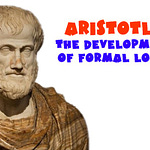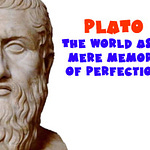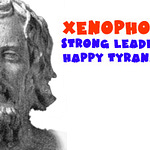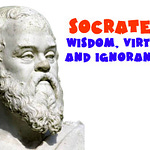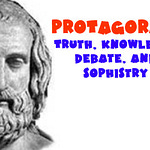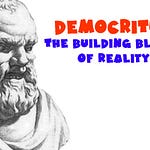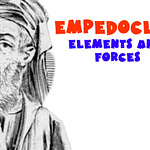Videos will be public for only a limited time. Paid subscribers get to view this video and all others in the archives.
You can also obtain the benefits of a paid subscription by sharing Three Minute Philosophy with others. For each new friend you bring in, you earn benefits. So spread the word!
The Ionian School of philosophy refers to a group of philosophers who lived between 500 and 600 BC in the city of Miletus, which was culturally Greek but existed in what is now modern day Turkey. The most prominent Ionian philosophers were Thales, Anaximander and Anaximenes, and they were the first philosophers to explore metaphysics.
Back in these early days of western civilization as we transitioned out of the Iron Age the people of western Europe settled down into relatively secure city states with robust trade economies so they had more spare time to sit down and really think about things.
And one of the first things they started thinking about was what is stuff made of?
Generally speaking, up until now the Greeks were more or less content with the idea that things just are the way they are, but then curiosity inevitably sets in. It’s obvious that air and water and trees are all very different types of things, but why are they different? Why is water wet? Why is fire hot? How do magnets work?
The history of philosophy almost always regards Thales to have been the first philosopher, somewhat arbitrarily, and basically just because he’s the guy Bertrand Russell started with.
He was an especially smart guy whose scientific accomplishments may be overstated but according to legend he was able to use his mathematical knowledge to predict the solar eclipse, which in those days must have made him look like a wizard.
What we do know is that he was somewhat of an entrepreneur, who made use of his scientific intelligence to corner the olive industry. But he was also eager to understand the mechanics of the way everything worked, what everything was made of, and whether there was some basic substance that held everything together.
Thales had an affinity for sailing and navigation which might have influenced his assertion that everything was made out of water, or at least that water was the primary substance. He thought that the entire world floated on water, which might have been a compelling thought to people looking out at the ocean and seeing nothing but water up to the horizon.
But what made water special was its ability to change forms. Unlike anything else he could think of, it could be solid, liquid, or gas depending on the circumstances.
Anaximenes agreed this was an important discovery, but he thought there was a substance even more fundamental than water. He decided that the most fundamental substance was air.
He observed that, unlike water, air was kind of everywhere, and he theorised that it was able to transform itself into anything else they were able to see around them, freely moving through different states like clouds, water, fire, and stone.
He thought that solid objects were formed when air was compressed really tightly in a similar way to how wool is compressed to make felt.
When he looked in the sky, he thought the heavenly bodies were up there floating around on the wind.
To demonstrate the changing nature of air, Anaximenes showed that if you blow on your hand with your mouth wide open, it feels warm, but if you blow with your lips pursed, it feels cold.
Today we know that Anaximenes misunderstood why his happens, but what’s important about his theories was that he was the first to come up with a metaphysics that was supported by evidence and observation.
In a way, Anaximenes was doing an early form of science.
The same can be said about Anaximander, whose work on a multitude of subjects was so prolific that he’s said to have written a book about it.
That book, On Nature, would have been the first book on philosophy or science ever written, unfortunately it no longer exists.
But even though Anaximander’s book is lost, we know what it was about thanks to the later philosophers who wrote about it.
For example, Anaximander expanded on the theories about the shape of the universe.
Although he didn’t consider the world to be round, he did get one step closer by theorising that it was a cylinder.
He also tried to map the entire known world, but of course, back in those days, the entire known world wasn’t very large.
But Anaximander continued the Ionian school’s project of trying to figure out what everything was made of, and he disagreed that it was either water or air.
In fact he didn’t think that it could be made of anything similar to what we already know about.
The reason was because he thought too many substances have opposites. For example, it didn’t seem plausible to suggest that fire was made of water.
Anaximander thought that if everything was made of water or air then over time we would have all been drowned or suffocated by new.
Instead, Anaximander put forward the idea that everything was actually made of a secret other thing called apeiron, or the Boundless.
The apeiron is difficult to define, and it’s uncertain how well Anaximander really knew what he meant either, but it was without form or physical character.
He thought that the apeiron was kind of the indescribable thing that everything else in the universe emerged from, and it has to be indescribable because if you could describe it then it wouldn’t be infinite and if it wasn’t infinite then you’d be left wondering where the apeiron came from.
If these all sound like silly questions to ask about the world then you have to consider that everything we know about the universe today through science had to begin somewhere, and these guys were literally starting from scratch.
They had nothing else to go on besides a wide assortment of creation myths about gods and monsters.
Maybe when you manage to become the biggest olive magnate in all of Greece you’ll be in a position to judge them.
Sources:
Adamson, Peter., Classical Philosophy: A history of philosophy without any gaps. Oxford University Press, 2014
Warren, James., Presocratics. Acumen, 2007
O’Grady, Patricia., Thales of Miletus (c. 620 B.C.E.—c. 546 B.C.E.). Internet Encyclopedia of Philosophy, 2023
Couprie, Dirk L., Anaximander (c. 610—546 B.C.E.). Internet Encyclopedia of Philosophy, 2023
What you get for subscribing:
Three Minute Philosophy is a fun and educational series of videos and essays about the history of philosophy.
Essays are free. Paid subscribers will gain access to full videos, printable PDFs, and possibly more in time.
Listen to this episode with a 7-day free trial
Subscribe to Three Minute Philosophy to listen to this post and get 7 days of free access to the full post archives.






